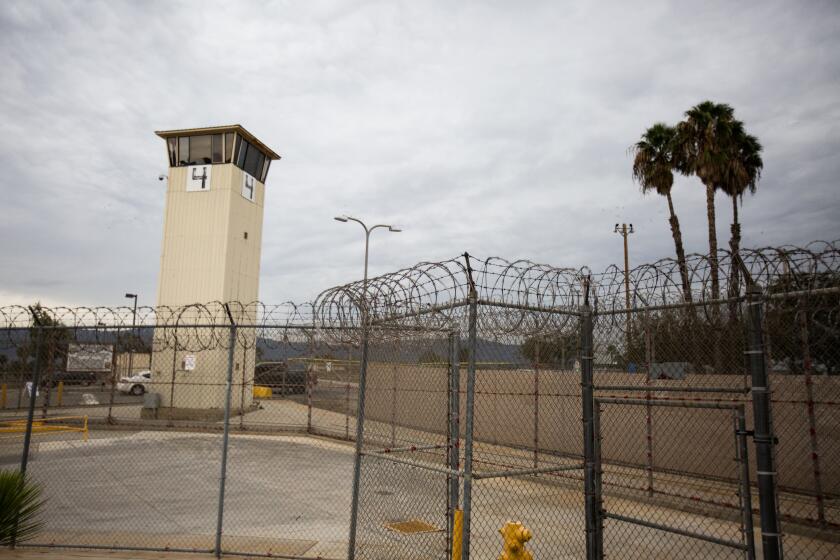Editorial: Criminal defendants’ right to counsel still shortchanged in much of California

- Share via
Saturday marks 60 years since the U.S. Supreme Court’s landmark ruling in Gideon vs. Wainwright, the case that secured for criminal defendants the right to a lawyer even if they can’t afford to hire one. The celebrated decision involved Clarence Earl Gideon, a Florida man who challenged his felony breaking-and-entering conviction for violating his 6th Amendment fair trial rights. He successfully argued that the judge failed to appoint a government-paid lawyer to represent him.
In the wake of the court’s 1963 decision, it became commonly understood that the government is required to provide defense lawyers to the indigent. “If you cannot afford an attorney,” police officers tell suspects upon arrest, “one will be provided for you.” Judges tell defendants the same thing when they first appear in court.
For the record:
1:22 p.m. April 7, 2023This editorial incorrectly states that the indigent defense program in Lake County is open to any lawyer who wants to participate and that no training is offered. In fact, lawyers who participate in the program must apply and be accepted, and free training is made available.
The Los Angeles County public defender office was already providing attorneys to indigent defendants a half century before the Gideon decision. It was the first such office in the nation.
But California is no longer the pace-setter. After the ruling, when most state governments began directly providing defense counsel, California continued to leave the task to its 58 individual counties, without standards or oversight. Two dozen counties still don’t have public defender’s offices (including San Luis Obispo County and smaller Northern California counties) and instead contract with individual law firms or lawyers, usually for flat fees awarded to the lowest bidder, regardless of how much time is needed for adequate representation.
Racism continues to infect the criminal justice system, leading to disproportionate numbers of Black and Latino Americans in prison. California can continue a program to correct the problem if Gov. Gavin Newsom signs AB 256.
California doesn’t collect data that could be used to evaluate the sufficiency of a defense lawyer’s services. Yet enough evidence is available to suggest that the quality of representation in many counties is often inadequate. A report last year by the state Legislative Analyst’s Office found that lawyers working under flat-fee indigent defense contracts have little incentive to put much time into their cases.
They likely encourage their clients to accept quick plea bargains. For the lawyer who can make ends meet only by carrying a huge caseload — one that allows too little time with each defendant to do an acceptable job — an early guilty plea means no precious time spent interviewing witnesses, checking evidence and alibis or assessing the strength of the prosecution’s case. For a defendant, even an innocent one, it may mean incarceration and being subjected to the severe consequences of having a criminal conviction, including losing housing, employment, even child custody or, for some immigrants, the right to remain in the U.S. Once the defendant pleads guilty, the right to appeal is lost.
The Sixth Amendment Center, an organization that advocates for indigent defense that meets constitutional standards, found troubling deficiencies in Lake County, north of the Bay Area. Poverty is high, the tax base is low, and there is little funding for defense services. Under a contract with the county, three lawyers subcontract out all indigent defense to any lawyer who wants to sign up. No training is offered. The county provides no supervision. The state provides no help or oversight.
Even counties with public defender offices can fall short. In Fresno County, for example, the Board of Supervisors slashed public defender budgets during an economic downturn a decade ago, leading to layoffs and unconscionably high caseloads for those who remained. A typical annual felony caseload was 1,000, giving each lawyer just over two hours for each case, from initial interview to plea bargaining to trial and sentencing. It was absurd, and the lawyers said so. The ACLU sued the county and the state over the failures.
Turmoil at the Los Angeles County public defender’s office may be putting the lives and liberty of thousands of county residents in jeopardy, and the immediate question is this: Is the appointment late last month of Nicole Davis Tinkham as interim public defender the problem?
A settlement in 2020 requires the state public defender’s office, which had been solely handling death penalty appeals at the time, to now offer technical assistance at the trial court level. But the state office, too, remains inadequately funded and staffed, and California still has no performance standards for either the state or the counties.
The smaller counties without public defender offices muddle on, to the detriment of their poor residents, who are far more likely than others to be arrested and prosecuted. The system is a particular failure for Black and Latino residents, who likewise are disproportionately caught up in the criminal justice system.
If the Sixth Amendment guarantee of right to counsel is to be more than a slogan and the American system of equal justice is to be more than a suggestion, California must step up. The state’s legislative analyst suggests legislation to measure the quality of indigent defense — whether it be by funding requirements, caseload maximums or other metrics — and set minimum performance standards for effective representation of counsel that the state and counties must meet.
There currently are no such legislative proposals, but there should be. Gideon vs. Wainwright offered an important promise 60 years ago. It’s time to make good on it for indigent defendants everywhere in this state.
More to Read
A cure for the common opinion
Get thought-provoking perspectives with our weekly newsletter.
You may occasionally receive promotional content from the Los Angeles Times.











